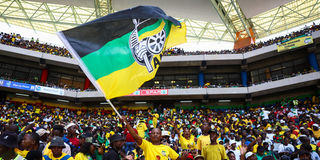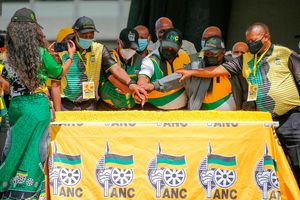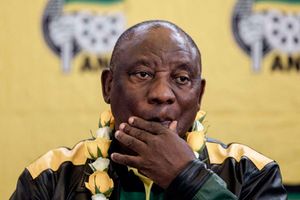
An African National Congress (ANC) supporter waves a flag during the 112th anniversary celebrations of the founding of the party, at Mbombela Stadium in Mpumalanga province, South Africa, January 13, 2024.
Former South African President Jacob Zuma wanted to get at his former party, the African National Congress (ANC) which has been ruling the country since 1994.
But the pace with which his new movement, uMkhonto we Sizwe (MK), has been rising in popularity, especially in his native Zulu ‘nation’ now depends on whether MK can succeed at the courts of law.
The beef related to the argument fronted by ANC that MK stole the ruling party’s name from the legendary uMkhonto we Sizwe (Spear of the Nation), the armed wing of ANC during the struggle against apartheid.
Last week, ANC failed to push for MK to be struck from the ballot after the Independent Electoral Commission (IEC), ruled there was no similarity in the logos used. ANC’s new strategy has been to turn to the courts over alleged copyright and trademark violations.
With critical elections – which could test ANC’s stranglehold on majority, the ruling party has belatedly sought redress for what it says is the ‘theft’ of its iconic imagery and name of its now-disbanded armed wing.
The elections are due at the end of May.
The case was filed in the High Court in Durban, just days after the IEC made its verdict last week. IEC is only limited election matters. Although the IEC has confirmed MK will be on the ballot, a negative ruling at the courts could give ANC new fuel to attack MK’s legitimacy in the race.
If the ANC wins, MK will be forced to make changes to both its imagery and name, but will also have to retain the logo and acronym ‘MK’ as these are what are registered by the IEC. It is too also too late to make changes to ballot papers, the IEC has indicated.
But the court may rule such that a forced and belated change to the ballot papers may be required.
That is important because MK has polled threateningly against ANC in Zulu homeland province of KwaZulu-Natal with some 25 percent support, much of it based on the personal popularity there of former president Jacob Zuma. He backed MK in December. The IEC decision means serious problems for the ruling party in that province – plus in others where Zulus live in high numbers, especially greater Johannesburg, centre of Gauteng province.
The ANC’s two-pronged strategy, via IEC and via courts, was meant to show that MK was confusing voters and hence eating illegally into ANC popularity, however.
MK’s legal arguments in the copyright and trade mark matter are essentially that the ANC did nothing about MK’s emergence, and use of ANC-associated name and images. It argued that ANC reacted only after Zuma’s endorsement of MK over his former political home, the ANC.
Due to his imprisonment in 2021, Zuma has been fiercely critical of current national President Cyril Ramaphosa, also leader of the ANC, and who succeeded Zuma. He is also said to have a deep personal animosity towards Ramaphosa due to his assigning of the cause of much of South Africa’s corruption problems to Zuma personally.
During the apartheid struggle, uMkhonto we Sizwe (Spear of the Nation) was the armed wing of the ANC, then a liberation movement rather than a political party.
Its name foreshortened to MK, the armed wing was formed by Nelson Mandela and other then militant ‘youth elements’, due to what they saw as the need to confront the racist white minority regime of the 1950s with force.
The armed wing of the ruling party, in the immediate post-apartheid period, wielded much influence due to its role in helping overthrow apartheid, but later was split between pro-Zuma elements and those supporting the main body of the ANC and its leader since 2017, Ramaphosa.
Recently, the ANC had disbanded the armed wing and reformed its veterans league to eliminate the inter-entity squabbling in its ranks, in the process casting out several pro-Zuma figures.
Subsequently, MK took what it saw as an ‘opportunity’, it is being argued in the High Court, to “ride on the coattails of the ruling party”.
MK was formed in the latter half of last year amid much secrecy, and the registered with the IEC, its registration process and papers having passed inspection due to the ANC’s failed challenge to MK’s appearance on the ballot.
MK told the court on Wednesday that as early as June 2023, the ANC knew of MK’s formation and intention to participate in the 2024 elections, but did nothing at that time. A decision in the copyright and trade mark battle may come within days.







